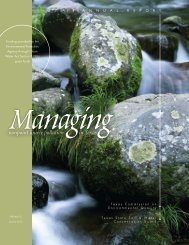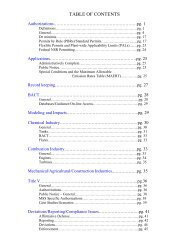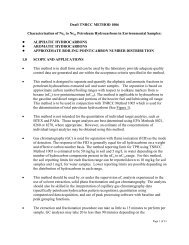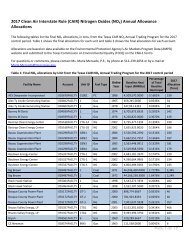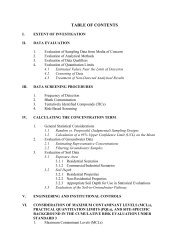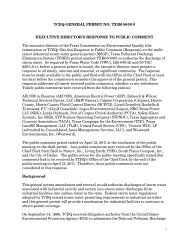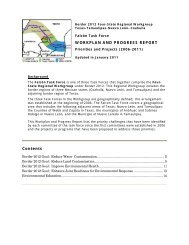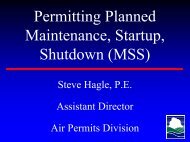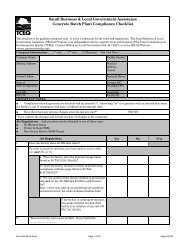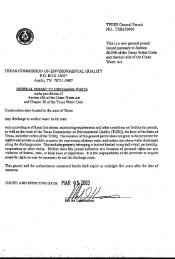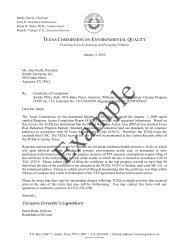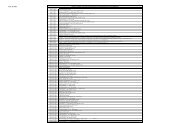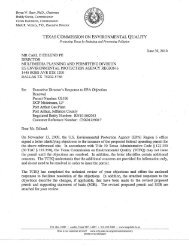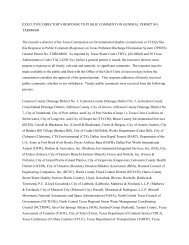Joint Groundwater Monitoring and ... - TCEQ e-Services
Joint Groundwater Monitoring and ... - TCEQ e-Services
Joint Groundwater Monitoring and ... - TCEQ e-Services
Create successful ePaper yourself
Turn your PDF publications into a flip-book with our unique Google optimized e-Paper software.
ackground water quality is often necessary to determine if contamination has<br />
occurred. Some compounds, such as refined gasoline or synthetic organic compounds<br />
are not naturally occurring <strong>and</strong> their presence in detrimental amounts constitutes<br />
contamination. Other constituents such as sodium, chloride, <strong>and</strong> nitrate are naturally<br />
occurring <strong>and</strong> a comparison to known background water quality is necessary to<br />
determine whether contamination has occurred.<br />
As noted earlier, the occurrence of highly mineralized groundwater or the reporting<br />
of significant concentrations of dissolved solids <strong>and</strong> certain other naturally occurring<br />
constituents from groundwater monitoring programs does not, of itself, constitute<br />
groundwater contamination. Many aquifers contain water categorized as slightly<br />
saline to very saline, ranging from 1,000 milligrams per liter (mg/l) of dissolved<br />
solids to 10,000 mg/l <strong>and</strong> greater. Mineralized waters are the result of natural<br />
hydrogeologic processes involving restricted circulation, chemical reactivity, <strong>and</strong><br />
residence time. These conditions exist in many areas of the state <strong>and</strong> wells producing<br />
poor quality water are common.<br />
Reporting of <strong>Groundwater</strong> Contamination<br />
Water-quality monitoring <strong>and</strong> reporting requirements addressing unauthorized<br />
discharges are generally described in rules specific to the activity being regulated.<br />
Program-specific groundwater monitoring requirements are discussed further under<br />
each of the agency or program headings in the section entitled <strong>Groundwater</strong><br />
Protection Program Descriptions.<br />
Unauthorized discharges to water in the state, including groundwater, from regulated<br />
activities under the <strong>TCEQ</strong>’s jurisdiction are prohibited (Texas Water Code, §26.121).<br />
Numerous state <strong>and</strong> federal laws either, 1) require monitoring of groundwater quality<br />
<strong>and</strong> notification to regulatory entities when such monitoring indicates an<br />
unauthorized discharge has impacted groundwater or, 2) direct the <strong>TCEQ</strong> to adopt<br />
requirements for monitoring <strong>and</strong> notification.<br />
Reporting Unauthorized Discharges <strong>and</strong> Spills<br />
The <strong>TCEQ</strong> is the state's lead response agency for all hazardous substance discharges<br />
or spills, discharges or spills of other substances, <strong>and</strong> certain inl<strong>and</strong> oil discharges or<br />
spills that may cause pollution. This authority is derived from §26.039 <strong>and</strong> §§26.261<br />
through 26.268 TWC (Texas Hazardous Substances Spill Prevention <strong>and</strong> Control<br />
Act). Pursuant to §26.039 (b), whenever an accidental discharge or spill occurs at or<br />
from any activity or facility which causes or may cause pollution, the individual<br />
operating, in charge of, or responsible for the activity or facility shall notify the<br />
<strong>TCEQ</strong> as soon as possible <strong>and</strong> not later than 24 hours after the occurrence. Section<br />
26.039 (a) defines an accidental discharge as an act or omission through which waste<br />
or other substances are inadvertently discharged into water in the state. The law<br />
further defines a spill as an act or omission in which waste or other substances are<br />
deposited where, unless controlled or removed, they will drain, seep, run, or<br />
otherwise enter water in the state, including groundwater. These provisions require<br />
that the <strong>TCEQ</strong> must be notified when contamination of soil or groundwater is<br />
discovered.<br />
The <strong>TCEQ</strong> has adopted Spill Prevention <strong>and</strong> Control Rules (30 TAC Chapter 327). A<br />
reportable discharge or spill is an unauthorized or accidental discharge or spill of oil,<br />
25



